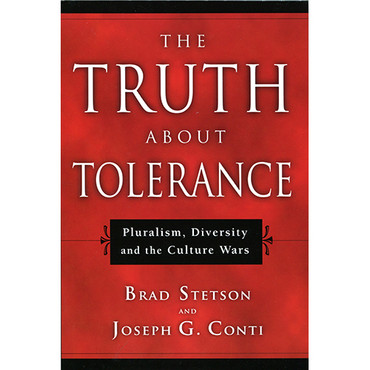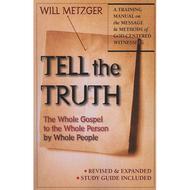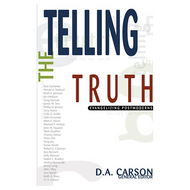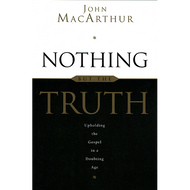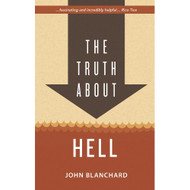Categories
Categories
The Truth About Tolerance by Brad Stetson & Joseph G. Conti (Paperback)
Product Description
Publisher's Description
Tolerance is a pivotal word used to identify high moral ground in debates taking place in our society. But there is confusion over what such a virtue really calls for. In this book Brad Stetson and Joseph G. Conti explore the use and misuse of this important value in academic circles and popular media. They note that the pursuit of truth and the pursuit of tolerance are often taken to be mutually exclusive ends with truth having to give way to tolerance. Stetson and Conti argue just the opposite: that true tolerance requires the pursuit of truth. In the end they demonstrate that Christian conviction about religious truth provides the only secure basis for a tolerant society which promotes truth seeking. Christians can contribute to civil debate without compromising their moral and spiritual convictions.
About the Authors
Joseph G. Conti earned a Ph.D. in religion and social ethics at the University of Southern California. A lecturer in religious studies at California State University--Fullerton, he has also taught at the University of Southern California, Kansas City Community College (Kansas), Longwood Community College (Kansas), Western Missouri State University, the University of San Francisco and California State University--Long Beach. He is also a coauthor of Challenging the Civil Rights Establishment (with Brad Stetson, Praeger Publishers, 1993) and Black and Right (with Brad Stetson and Stan Faryna, Praeger Publishers, 1997).
Tolerance originally meant being able to respect a person while disagreeing with their ideas, beliefs or behaviors. Today it has come to mean accepting what your opponent says, believes or does. If someone today objects to something like abortion on demand or same-sex marriage, he or she is labeled as intolerant, bigoted and narrow-minded.
Thus any person who now expresses an opinion or makes a moral critique which does not fit in with our politically correct culture is deemed to have committed the gravest of sins: being intolerant. But as the authors show, the ability to exercise moral discernment and make critical evaluations is at the heart of genuine democracy and the social good.
By demanding conformity to the values regime of the secular left, the goal posts in value making have been shifted. The authors show that the new tolerance is closely aligned with moral relativism and the postmodern distrust of truth. But without true truth and moral absolutes, the entire concept of tolerance becomes meaningless.
We can only tolerate something if we do not agree with it in the first place. We do not tolerate something we like or agree with. But if there is no absolute truth, and moral values are simple subjective preferences, then convictions and beliefs become mere preferences and tastes. No one needs to tolerate another person's preference for chocolate ice cream. No one needs to tolerate another person's taste for classical music.
If all beliefs and moral claims are mere matters of choice and preference, then tolerance no longer is necessary. If we accept the postmodern belief that all truth is self-created, then no one has a right to challenge any belief, or make any moral judgment. In which case, we have nothing left to be tolerant of.
Indeed, as the authors point out, the "belief in truth as subjectivity short-circuits discussion" and makes genuine social interaction impossible. Tolerance only functions in a setting where real dialogue, debate and intellectual sparring is allowed to take place.
The authors show that the secular left has used the notion of tolerance to push their own agenda. The new relativists argue that believers who insist on moral values are being intolerant and exclusive, yet they demand a whole set of their own moral absolutes, be it the right to abortion, complete choice in all matters sexual, and so on. Thus in their appeal to moral relativism to silence the so-called religious right, they make their own appeal to fundamental moral values: tolerance, neutrality, pluralism, etc. They want to have their cake (there are no moral absolutes) and eat it too (their moral values should be absolutely adhered to).
Moreover, tolerance itself is not an absolute There are some things that we should not tolerate. It is neither tolerant nor civil to stand by while a woman is raped or some crime is being committed. True tolerance means the making of moral judgments and sound evaluations.
The authors conclude by reminding us that the secular left has high-jacked the concept of tolerance to promote its own ideological agenda. They seek not just to separate church from state, but religion from society. In the process, they are imposing their own secular values on the rest of society, all in the name of tolerance. But as the authors document, often the most intolerant people today are those who shout loudest for tolerance.
True tolerance is a virtue and should be practiced, both privately and publicly. But as the authors make clear, a new type of tolerance - really an imposter - has subverted it, taking its place. The new tolerance is no tolerance at all, but a new form of totalitarianism. And we should not be tolerant of that.
 Loading... Please wait...
Loading... Please wait... 
